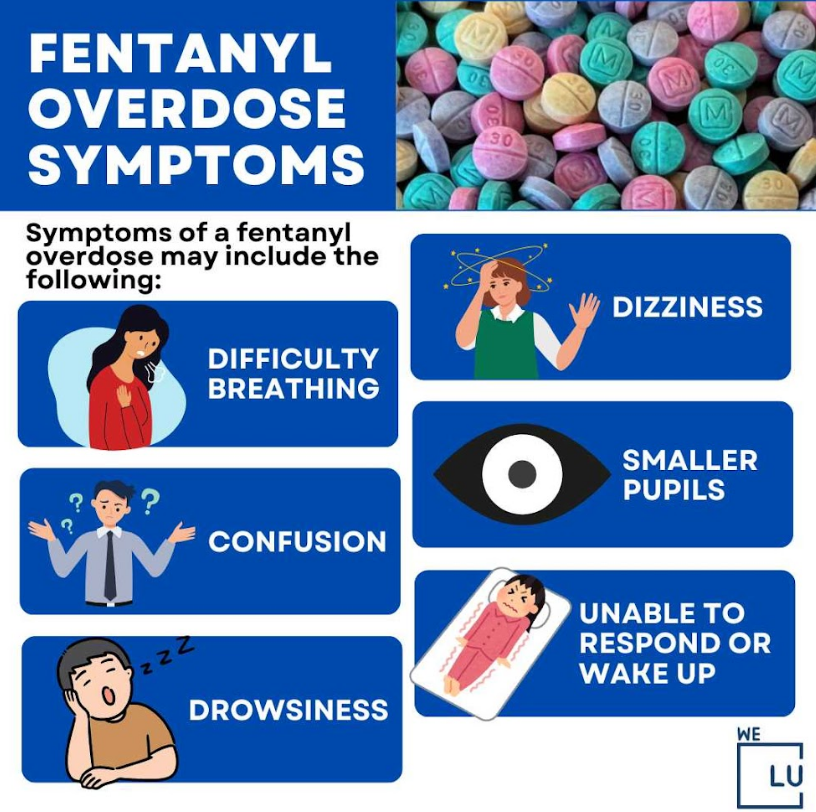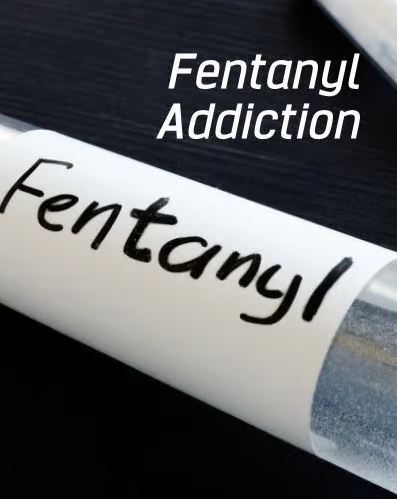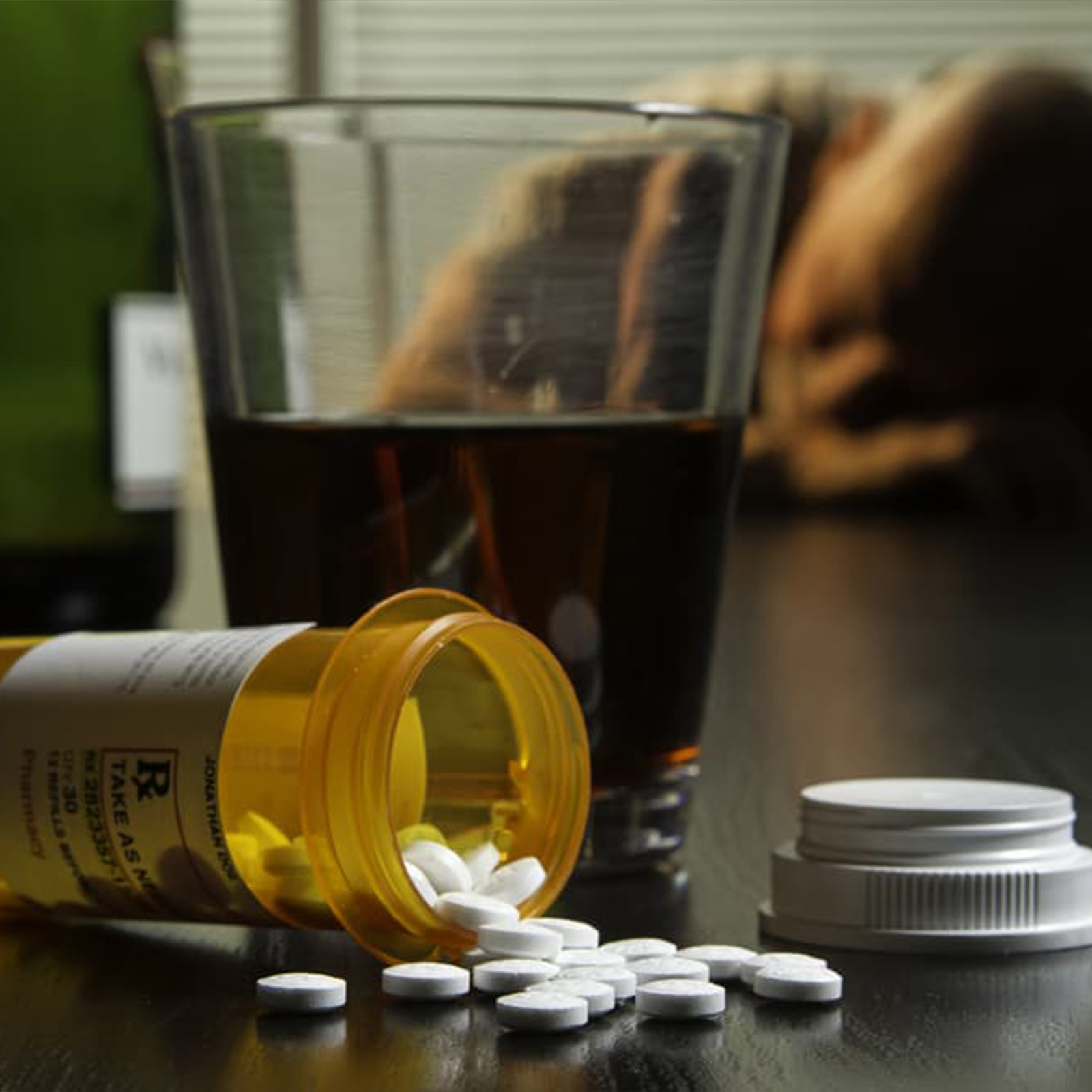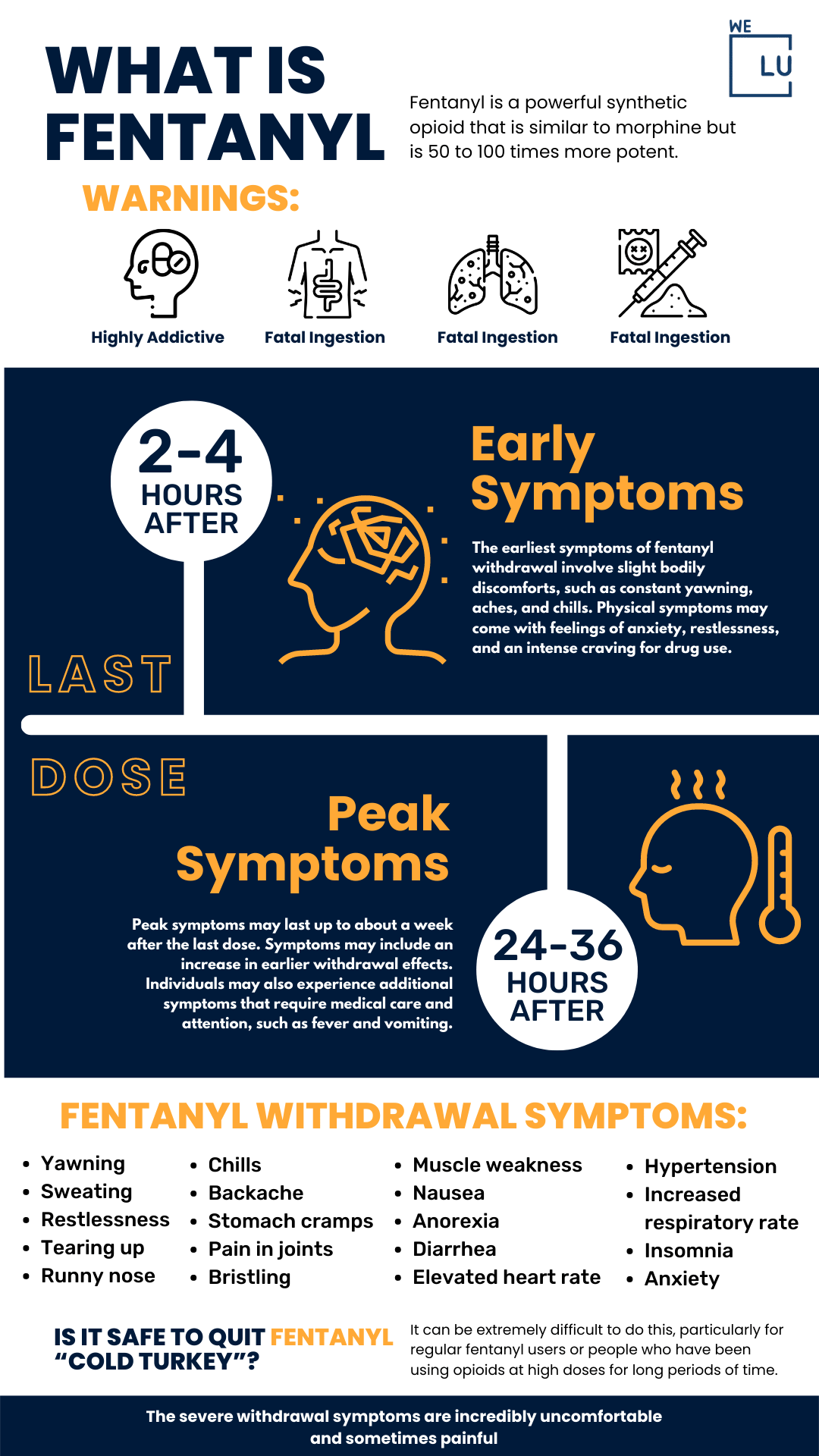What is Fentanyl?
Fentanyl is a potent synthetic opioid analgesic similar to morphine but is 50 to 100 times more powerful. It is a Schedule II controlled substance and is medically used to treat patients with severe pain or manage pain after surgery. Taking certain medications with fentanyl may increase the risk of developing severe or life-threatening breathing problems, sedation, or coma. Fentanyl is addictive because of its potency, and fentanyl addiction is a painful condition that affects more Americans than one would think. Fentanyl detox is the process of weaning someone off of a fentanyl dependency. In a medical fentanyl detox facility, your fentanyl withdrawal symptoms can be treated real-time and your treatment adjusted accordingly.
Fentanyl is also sometimes used to treat patients with chronic pain who are physically tolerant to other opioids. In its prescription form, fentanyl is known as Duragesic, Actiq, and Sublimaze. Fentanyl may be habit-forming [1]. The most recent fentanyl overdose and death cases in the U.S. are linked to illegally made fentanyl. It is sold through illegal drug markets for its heroin-like effect. It is often blended with heroin and cocaine as a combination drug —with or without the user’s knowledge—to increase its euphoric effects. Overdose deaths involving fentanyl and fentanyl analogs (carfentanil) increased by over 16% from 2018 to 2019. More than 36,000 people died from overdoses involving synthetic opioids, including fentanyl, in 2019.
Fentanyl can be administered in so many different ways (snorting, shooting, boofing, orally) the administration method determines how long the effects of fentanyl are and how long it may stay in your system. When someone who suffers from an addiction to this drug suddenly stops using it, fentanyl withdrawal symptoms can occur. It is important to remember that recovery from fentanyl addiction takes much more than simply ending drug use. The underlying causes of the addiction and the mental illness from the addiction itself must be addressed for the best chances of successful fentanyl addiction treatment and recovery.


Get Your Life Back
Find Hope & Recovery. Get Safe Comfortable Detox, Addiction Rehab & Dual Diagnosis High-Quality Care.
Hotline(844) 597-1011Methods of Use
When prescribed by a doctor, fentanyl can provide a shot, a patch on a person’s skin, or as tablets that are sucked like cough drops. The illegally used fentanyl most often associated with recent overdoses is made in labs. This synthetic fentanyl is sold unlawfully as a powder, dropped onto blotter paper, put in eye droppers and nasal sprays, or made into pills that look like other prescription opioids. Some drug dealers mix fentanyl with other drugs, such as heroin, cocaine, methamphetamine, and MDMA.
This is because it takes very little to produce a high with fentanyl, making it a cheaper option. This is especially risky when people taking drugs don’t realize they might be cut with fentanyl as a cheap but dangerous additive. As a result, they might be taking more potent opioids than their bodies are used to and can be more likely to overdose.
How Does Fentanyl Affect the Brain?
Like heroin, morphine, and other opioid drugs, fentanyl works by binding to the body’s opioid receptors, which are found in areas of the brain that control pain and emotions. After taking opioids many times, the brain adapts to the drug, diminishing its sensitivity and making it hard to feel pleasure from anything besides the pill. As a result, when people become addicted, drug-seeking and drug use take over their lives.
Fentanyl Addiction Signs
Some of the signs someone is on fentanyl or abusing fentanyl include:
- Euphoria followed by depression or confusion
- Slowed heart rate and breathing
- Weakness and trouble walking
- Stiffness of muscles
- Dizziness
- Fainting
- Shaking
- Slurred speech
- Drowsiness
- Nausea and vomiting
- Itching and scratching
- Pinpoint pupils
- Hallucinations
- Urine retention
- Dry mouth
- Loss of appetite
- Sleeping problems
- Swollen arms or legs
While the above are signs of someone taking fentanyl, long-term effects also develop if someone chronically abuses the drug. Some of these include gastrointestinal problems, a weakened immune system, and the potential for seizures to occur. With the chronic use of fentanyl, sedative effects may also increase over time. You may also notice someone is on fentanyl if they go through behavioral or mental changes, including paranoia, social withdrawal, a loss of motivation, or other personal changes.
How Long Does It Take To Get Addicted To Fentanyl?
Tolerance is the primary symptom of being addicted to fentanyl. As you continue to use a drug, you can slowly build up a tolerance to it, which means that you no longer get the same feeling or high that you once got by taking a small amount.
Once your tolerance begins to build, you might increase the dose or frequency of taking the drug. You are trying to get that same high that you felt in the beginning when your body was not used to the drug. As you continue to build tolerance, you end up taking more of the drug. Your body becomes chemically dependent on the drug. This means you discover that you need to take the drug just to feel normal or leveled out.
Side Effects of Fentanyl Use
Fentanyl is fast-acting but somewhat short-lived when compared to other drugs. It can take effect minutes and last as short as a half-hour or as long as one-and-a-half hours. It is measured in micrograms (mcg) because of its potency and risk for fentanyl overdose, even in very small amounts. One dosage in a hospital setting is 5 to 20 mcg, with an average of 10 mcg.
Short-Term Side Effects of Fentanyl
Not every person will experience the same side effects the same way. Some of the common short-term negative effects of fentanyl are:
- Sedation
- Confusion
- Dry mouth
- Increased thirst
- Chest pain
- Pale skin
- Drowsiness
- Dizziness
- Loss of appetite
- Nausea or vomiting
- Unusual tiredness or weakness
- Difficulty urinating
- Pinpoint pupils
- Respiratory depression
Long-Term Side Effects of Fentanyl
Long-term use of fentanyl can lead to heart or respiratory problems. Further, people who inject fentanyl and share needles have an increased risk of contracting HIV/AIDS, hepatitis, or other infectious diseases.
- Reduced urine output
- Anxiety
- Feeling cold
- Headache or pain in the head
- Abnormal heart rhythm
- Low blood pressure
- Chest pain
- Coughing up blood
- Dyskinesia, or trouble with voluntary movement
- Nightmares
- Feeling like the room is spinning
- Stinging skin
- Throat irritation
- Kidney damage
- Eczema or other skin disorder
- Bloating or swelling of the face or extremities
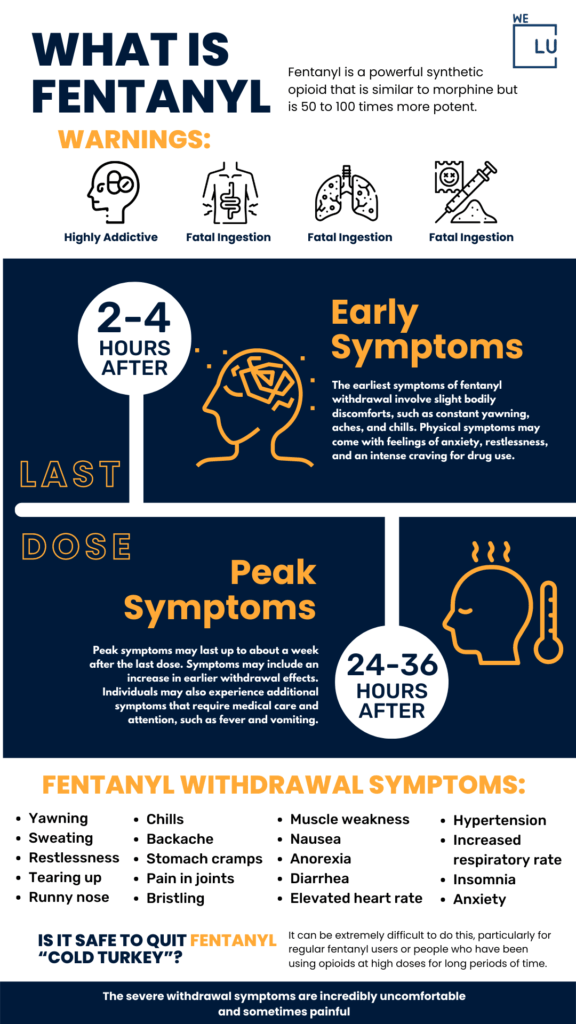
Get Help. Get Better. Get Your Life Back.
Searching for Accredited Drug and Alcohol Rehab Centers Near You?
Even if you have failed previously and relapsed, or are in the middle of a difficult crisis, we stand ready to support you. Our trusted behavioral health specialists will not give up on you. When you feel ready or just want someone to speak to about therapy alternatives to change your life call us. Even if we cannot assist you, we will lead you to wherever you can get support. There is no obligation. Call our hotline today.
(844) 597-1011Can you Overdose on Fentanyl?
Yes, a person can overdose on fentanyl. Anyone who uses drugs that may contain fentanyl, even occasionally, is at risk of a fentanyl overdose. A fentanyl overdose can overwhelm the central nervous system, disrupting the pathways that control heart function and breathing. Many people who overdose on fentanyl will fall asleep and never wake up if someone at risk of a fentanyl overdose is breathing exceptionally shallow or slow. This can decrease the amount of oxygen that reaches the brain, a condition called hypoxia. Hypoxia can lead to a coma, permanent brain damage, and even death.
Overdose deaths involving synthetic opioids were nearly 12 times higher in 2019 than in 2013. More than 36,000 people died from overdoses involving synthetic opioids in 2019. The latest provisional drug overdose death counts through May 2020 suggest accelerating overdose deaths during the COVID-19 pandemic.
Fentanyl Overdose Symptoms
Fentanyl can have harmful cross-reactions with other sedatives. This can be seen in Klonopin detox symptoms (clonazepam), Xanax addiction (alprazolam), Ativan addiction (lorazepam), and alcohol abuse. The combination of these drugs will intensify the depressing effects on the central nervous system (brain and spinal cord). The following are symptoms of fentanyl overdose:
- Body is limp
- Awake, without the ability to speak
- Changes in skin color (darker-skinned people look grayish or ashen, and lighter-skinned people look bluish purple)
- Vomiting
- Fingernails and lips turn blue or purplish black
- Pulse (heartbeat) is slow, erratic, or not there at all
- Making a snore-like gurgling noise or “death rattle,” choking sounds
- Loss of consciousness
- Non-responsive to outside stimulus
- Very slow, shallow, erratic, or stopped breathing
- The face is pale or clammy
How Much Fentanyl to Overdose?
People can overdose on fentanyl when they take too much of the drug. On average, fentanyl is lethal when someone takes 2 mg (milligrams). However, it is possible for someone to overdose on less of this drug. This is especially true when fentanyl is mixed with other drugs, especially opioids. The risk of overdose increases when the drug is mixed with other respiratory depressants since the lungs will essentially be affected by all drugs a person takes. This can increase the risk of death.
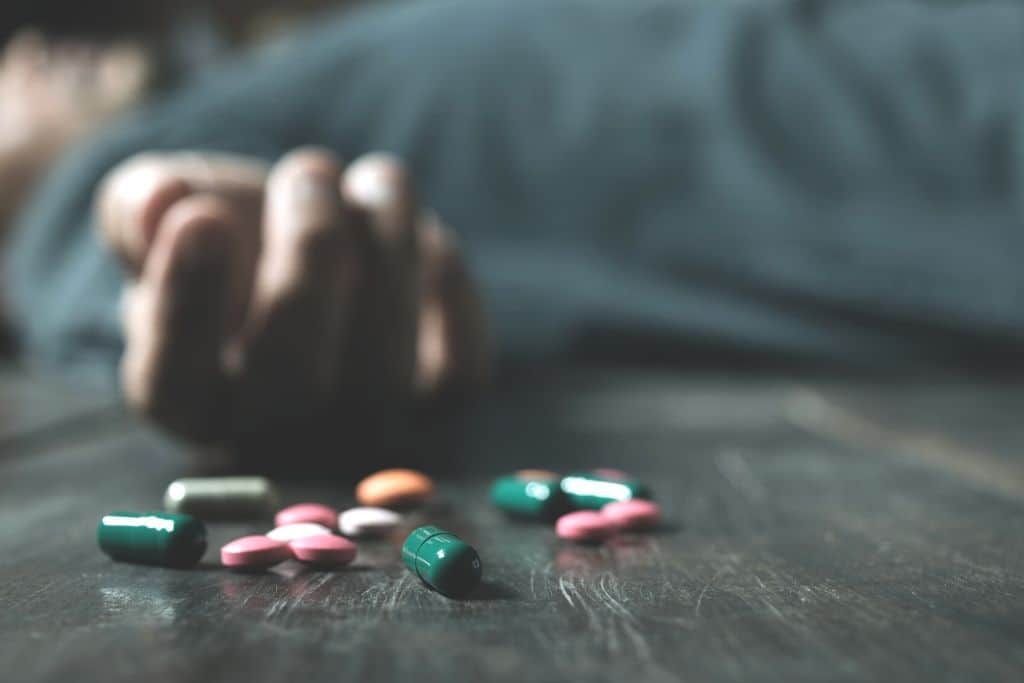
Fentanyl is gaining its way into many street drugs and driving the increase in drug overdose deaths. Fentanyl detox is the first step to overcoming fentanyl addiction.
How Can an Overdose Be Treated?
As mentioned above, many drug dealers mix the cheaper fentanyl with other drugs like heroin, cocaine, MDMA, and methamphetamine to increase their profits, making it often difficult to know which drug is causing the overdose. Naloxone is a medicine that can treat a fentanyl overdose when given right away. It works by rapidly binding to opioid receptors and blocking the effects of opioid drugs. But fentanyl is more substantial than other opioid drugs like morphine and might require multiple doses of naloxone.
Because of this, if you suspect someone has overdosed, the most crucial step to take is to call 911 so they can receive immediate medical attention. Once medical personnel arrives, they will administer naloxone if they suspect an opioid drug is involved.
Specialists should monitor people given naloxone for another two hours after the last dose of naloxone is given to ensure breathing does not slow or stop. Some states have passed laws that allow pharmacists to dispense naloxone without a personal prescription. Friends, family, and others in the community can use the nasal spray versions of naloxone to save someone who is overdosing.
What to Do in Case of a Fentanyl Overdose?
- Call 911 for medical help.
- Give naloxone if you have it. Spray Narcan Nasal Spray into one nostril, or inject intramuscular naloxone into the upper arm or thigh.
- Naloxone (brand name: Narcan) is a medication that reverses the effects of fentanyl overdose. It became legal to carry naloxone in New York State in 2006.
- If the person is not breathing, do rescue breathing (mouth-to-mouth) or CPR if you know how.
- Wait two minutes for the person to respond. Continue rescue breathing (or CPR if you are trained). If the person does not respond after two minutes, give a second dose of naloxone.
- Lay the person on their side in the rescue position, so they do not choke if they vomit.
- Wait for help to arrive.
First-class Facilities & Amenities
World-class High-Quality Addiction & Mental Health Rehabilitation Treatment
Rehab Centers TourRenowned Addiction Centers. Serene Private Facilities. Inpatient rehab programs vary.
Addiction Helpline(844) 597-1011Proven recovery success experience, backed by a Team w/ History of:
15+
Years of Unified Experience
100s
5-Star Reviews Across Our Centers
10K
Recovery Success Stories Across Our Network
- Low Patient to Therapist Ratio
- Onsite Medical Detox Center
- Comprehensive Dual-Diagnosis Treatment
- Complimentary Family & Alumni Programs
- Coaching, Recovery & Personal Development Events
Is Fentanyl Addictive?
Yes. Fentanyl is addictive because of its potency. A person taking prescription fentanyl as a doctor instructs can experience dependence, characterized by withdrawal symptoms when the drug is stopped. A person can depend on a substance without being addicted, but dependency can sometimes lead to addiction.
Addiction is the most severe form of substance use disorder (SUD). SUDs are characterized by compulsive drug seeking and drug use that can be difficult to control, despite harmful consequences. When addicted to drugs, they continue to use them even though they cause health problems or issues at work and home. A SUD can range from mild to severe.
People addicted to fentanyl who stop using it can have severe withdrawal symptoms that begin as early as a few hours after the drug was last taken. These symptoms include:
- Muscle and Bone pain
- Sleep Problems
- Diarrhea and Vomiting
- Cold Flashes with goosebumps
- Uncontrollable leg movements
- Severe Cravings
World-class, Accredited, 5-Star Reviewed, Effective Addiction & Mental Health Programs. Complete Behavioral Health Inpatient Rehab, Detox plus Co-occuring Disorders Therapy.
CALL(844) 597-1011End the Addiction Pain. End the Emotional Rollercoaster. Get Your Life Back. Start Drug, Alcohol & Dual Diagnosis Mental Health Treatment Now. Get Free No-obligation Guidance by Substance Abuse Specialists Who Understand Addiction & Mental Health Recovery & Know How to Help.
Fentanyl Addiction Treatment Near Me
First and foremost, if you think that a loved one is abusing fentanyl, you should first research the drug and addiction associated with it to better understand what your loved one needs. Next, you must plan an intervention to provide your loved ones with options to battle the effects of fentanyl abuse in a safe and supportive environment. During this intervention, offer compassion and support instead of judgment. Lastly, offer your support throughout the entire treatment process.
In addition, prolonged drug use can have severe physical and psychological effects on you, so it is essential to seek treatment as soon as possible. Inpatient drug rehab offers intensive care that can help you promptly get through the early stages of withdrawal.
Medically-Assisted Detox
Medical detox is often considered the first stage of treatment. It will help you navigate the complicated withdrawal process but doesn’t address patterns of thought and behavior that contribute to drug use. Various treatment approaches and settings can help provide the ongoing support necessary to maintain long-term sobriety after you complete detox.
Cravings are very common during detox and can be challenging to overcome. This often leads to relapse. Constant medical care provided during inpatient treatment helps prevent relapse. Clinicians can provide necessary medication and medical expertise to lessen cravings and the effects of withdrawals.
Psychotherapy
Several different modalities of psychotherapy have been used in the treatment of mental health disorders along with addiction, including:
- Cognitive Behavioral Therapy (CBT) – is an effective treatment that involves changing both the patterns of negative thoughts and the behavioral routines which are affecting the daily life of the depressed person for various forms of depression.
- Dialectical Behavioral Therapy – is a comprehensive mental health and substance abuse treatment program whose ultimate goal is to aid patients in their efforts to build a life worth living. The main goal of DBT is to help a person develop what is referred to as a “clear mind.”
- Person-Centered Therapy – is a strategy that allows and encourages clients to understand and resolve their concerns in a safe, supportive environment.
- Solution-focused therapy is an approach interested in solutions that can be quickly implemented with a simple first step leading to further positive consequences.
Dual Diagnosis Treatment
Drug abuse and mental health disorders often co-occur. In many cases, traumatic experiences can result in a mental health disorder and substance abuse. Dual diagnosis rehabilitation treats both of these issues together. The best approach for the treatment of dual diagnosis is an integrated system. This strategy treats both the substance abuse problem and the mental disorder simultaneously. Regardless of which diagnosis (mental health or substance abuse problem) came first, long-term recovery will depend largely on the treatment for both disorders done by the same team or provider.
Medication-Assisted Treatments
Medication-Assisted Treatments (MAT) for substance use disorders and mental health disorders are commonly used in conjunction with one another. This includes the use of medications and other medical procedures. During your rehab, the staff from your treatment facility will help you identify what caused your addiction and teach you skills that will help you change your behavior patterns and challenge the negative thoughts that led to your addiction. Sometimes, the pressures and problems in your life lead you to rely on substances to help you forget about them momentarily.
Please, do not try to detox on your own. The detox process can be painful and difficult without medical assistance. However, getting through the detox process is crucial for continued treatment. We Level Up provide proper care with round-the-clock medical staff to assist your recovery through our opioid addiction treatment program medically. So, reclaim your life, and call us to speak with one of our treatment specialists. Our counselors know what you are going through and will answer any of your questions.

“This Was Not How I Wanted To Live”, Ryan’s Recovery From Fentanyl, Heroin, & Oxycontin Addiction Video
Ryan’s Addiction Recovery Story and Testimonial
“My name is Ryan and I’m the transportation manager.
My clean date is September 14, 2016. My addiction was in and out of meetings for ten years, in and out of jail for eight, in and out of rehabs for six years.
Before I came down to Florida, I was homeless. I was sleeping on park benches when I couldn’t find a couch or a car to sleep in.
The main thing that brought me down was Fentanyl powder straight from China, Meth, Heroin, OxyContin, all of it.
I was just done.
I just I had a little bit of 78 days clean and I went home because I had $50,000 in warrants that I had to clear up used again, and was back in Florida a week later. And I looked in the mirror and I had a God moment and I realized that this was not how I wanted to live anymore. And that was the last. And I flushed it, flushed a half gram of dope down the toilet and that was it.
Got a home group while I was in treatment. Got a service commitment while I was in treatment. When I got out of treatment, I would walk to meetings. I would do everything that I was suggested to me. My first eight and a half months clean, I was going to twelve meetings a week minimum. I started working steps after I found the right sponsor. I had two home groups doing service. In both of those home groups, I started paneling H and I at 90 days and got a commitment at six months.
Today I am free from drugs. I live by myself in an apartment that I can afford. I can, ya know, My family talks to me when I go home for vacation. I’m welcomed and looked up to by all my friends back home who are still using or who want to be clean today. I get to do whatever I want, travel wherever I want, and not have to have something in my pocket to make sure that I can get through without being sick.”
Does Addiction Rehab Work?
Longer stays in treatment frequently result in better outcomes, however success can vary from person to person. Detox alone is rarely beneficial for long-term recovery. Does treatment work? Attending treatment increases a person’s chances of long-term recovery compared to not attending.
Experience Transformative Recovery at We Level Up Treatment Centers.
See our authentic success stories. Get inspired. Get the help you deserve.
Start a New Life
Begin with a free call to an addiction & behavioral health treatment advisor. Learn more about our dual-diagnosis programs. The We Level Up Treatment Center Network delivers recovery programs that vary by each treatment facility. Call to learn more.
- Personalized Care
- Caring Accountable Staff
- World-class Amenities
- Licensed & Accredited
- Renowned w/ 100s 5-Star Reviews
We’ll Call You



